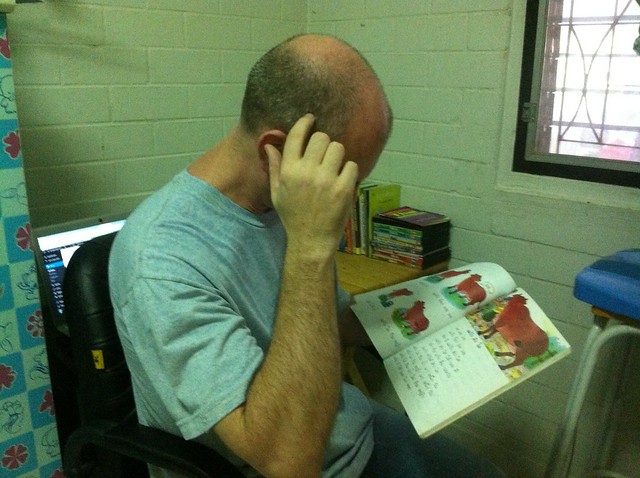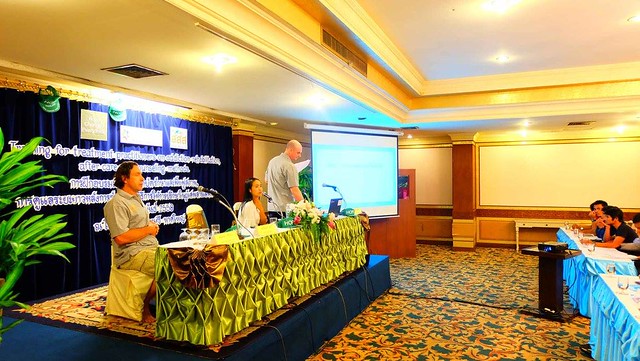Learning Thai with Mindfulness and Kindness
How could I ever hope to speak Thai fluently when my reaction to somebody talking to me in this language was to feel like a deer caught in the headlights of an oncoming car?
It is now exactly one year since my Thai fluency challenge, so maybe this is a good time for an update (thanks to Harri Terminus for encouraging me to do this post). I’ve also been meaning to write something about how a change in mindset has had a profound impact on my progress, so what follows provides me with an opportunity to delve into this as well.
how to order a prednisone taper Learning Thai Didn’t Need to Be a Challenge
Last year, I committed myself to a six-month period of intensively studying the Thai language – this came after about 14 years of yo-yo learning (i.e. a couple of days or weeks of intensive study followed by months of feeling bad about not studying). During the challenge, I was studying up to six hours per day and restricting all entertainment (TV, movies, music, and books) to the Thai language. I used the word ‘challenge’ in the beginning because it did seem like a bit of a sacrifice, but the surprising thing was actually doing it was so much fun – it didn’t feel like much of a challenge at all.
So what happened after my six-month challenge? Have I returned to yo-yo learning? Was that six months just a blip in an otherwise perfect record of learning Thai the wrong way?
That period of intensive study gave me a solid foundation in my push towards fluency in Thai (I was so fortunate to benefit from the knowledge and wisdom of kind people like Stuart Jay Raj), but I suspect I’ve actually made more progress during the last six months. That period of intensive learning gave my studies some much needed momentum, but there has also been more recently a significant shift in my mindset towards learning Thai and speaking it that has given me a a real boost.
buy deltasone prednisone The Real Challenge of Learning Thai
I could comprehend written Thai reasonably well before I began the challenge, but my main problem has been speaking the language. I can get incredibly uncomfortable in social situations – my inner negative dialogue (which is in English) can make speaking in a foreign tongue almost impossible. The exception to this was during my early years of living in Thailand when I was drunk most of the time -back then I could happily chat with my Thai neighbors for hours despite my inebriation seriously limiting my ability to make progress with the language (it was more a case of them learning to understand me).
I used to worry only charismatic extroverts have the ability to speak a language like Thai fluently. As beginners who are finding their feet in the language, these guys don’t get so discouraged by the blank stares of Thai people who can’t understand them. Their confidence combined with their need to be understood gives them the motivation to just keep ploughing through until they are understood. How could I compete with that? How could I ever hope to speak Thai fluently when my reaction to somebody talking to me in this language was to feel like a deer caught in the headlights of an oncoming car?
I am convinced mindset is hugely important when it comes to making progress in Thai, but this mindset is something we can adopt rather than it being limited to a special group of people. There is hope for those of us who are not naturally charismatic or extroverted, and for me the answer has been mindfulness.
What the Hell Does Mindfulness Have to Do with Learning Thai?
A few years ago, I wrote a post on the A Woman Learning Thai website titled ‘How Mindfulness Can Help You Learn Thai’. This approach to the dealing with the mind has been a powerful force for good in my life, and it certainly seemed to offer obvious advantages for studying a language. It is only in recent months that I’ve been able to fully appreciate how revolutionary this mindset can be when it comes to speaking Thai.
For some of us, even speaking in our own language can be stressful and unsatisfying. My mind likes to provide an unhelpful running-commentary while I’m engaging in conversation (e.g. “you sound stupid”, “you’re talking too much” or “you’re talking too little”). Too often, I’ve walked away from these encounters wishing I hadn’t opened my mouth at all. This process is intensified ever further if I’m speaking in a foreign language and the person is obviously struggling to understand me – it’s hardly any wonder that I developed a reluctance to speaking Thai.
Mindfulness is all about remembering to put my attention where it is going to be most useful at any given moment. It is an acknowledgement that what I’m focusing on is worthy and deserving of my full attention. This usually means concentrating on what is actually before me rather than getting trapped in the stories in my head.
What I’m alluding to is easier to understand if you experience it so let’s do a little experiment. Place you hand on surface and focus your attention on the sensation in the hand. I want to keep your focus on this sensation and try to think at the same time. My guess is that you will notice your attention flipping from one to the other – i.e. you can’t stay focused on what is there and think about it at the exact same time.
My difficulties around speaking Thai are because my attention has been directed more towards my thoughts about what is happening rather than what is happening. I’m not fully engaged in the conversation – it’s more like a sideshow instead of the main event. I’m so caught up in discursive thinking that I don’t actually care about what the other person is saying. I’m so focused on my fear of being judged and ridiculed that every word I utter is like a minute with my head stuck out of the trenches with somebody just waiting to shoot me.
One of the keys to understanding what people are saying is to care about what they are saying. My progress with the language was seriously restricted because I just didn’t care enough. This wasn’t a mindset I deliberately set out to cultivate – it was just an ineffective coping strategy that I picked up along the way to protect my self-esteem.
If I really care about what the other person is saying, I can give them my full attention. It means I’m not going to be caught up in my thoughts because I can’t do that and remain focused on the conversation (see the experiment above). This is what mindfulness is all about. I then reply to this person out of a human urge to communicate rather than it being viewed as some type of test I’m expecting to fail.
Mindfulness as Kindness
Mindfulness can be described as a type of kindness – in order to be kind to something, I need to give it my full attention. I’m saying this thing deserves my attention. Most spiritual traditions encourage us to be kind to other people, but we can also develop this same feeling of compassion towards life in general. Compassion is excellent for triggering a high degree of focused concentration, and this can be very useful when it comes to learning a language.
I’m listening to Thai in a different way than I used to before. I once believed all that was needed to make progress was to bombard myself with a steady stream of words, but this approach turned out to be ineffective. I’ve been listening to Thai for 15 years (I have Thai music playing the background most of the time), but it hasn’t been enough to ensure progress. The secret is to give my full attention to whatever is being said by developing a love for the sounds and yearning to understand their meaning.
So Where am I at Now?
I still devote about two hours per day deliberately learning Thai, but I spend more time than that just enjoying the language. Reading Thai out loud has been a great help, and I do this for about 20 minutes per day (I uses sources like the Pantip forum for things to read). I had decided to not bother with any more paid language learning courses, but I have found great value in the Spicy Red podcast. I spend about 10 hours plus in the car each week, and I use this to listen to Thai talks about mindfulness and related topics.
A couple of months ago, I was asked to give a presentation about mindfulness in Thai to a group of nurses, therapists, and doctors. I’ve given similar presentations in the past, but I’ve always depended on a translator. I talked for about 20 minutes – at times I was speaking way too fast – but I’m so glad I did it. Giving this presentation rose the bar in regards to my own expectations as to what is possible.


I have just seen a TV show explaining introvertite vs extrovertite people. I beleave you must be a bit toward introvertite and this is maybe why it is so hard to learn a language. In the show they explained that intro/extrovertite has nothing to do with shyness. But i think that a shy introvertite will have a hard time learning a new language! Fortunately it is not my case! Loved your article!
Thanks a million Michel – I agree with you that extroverts have an initial advantage but there is hope for the rest of us yet 🙂